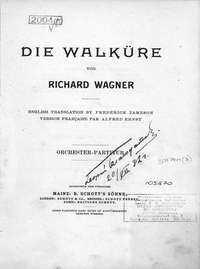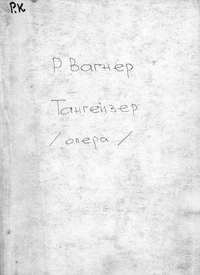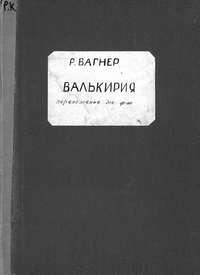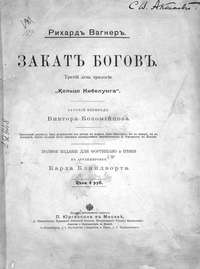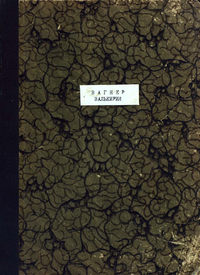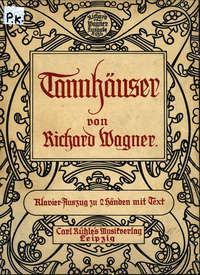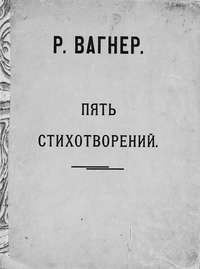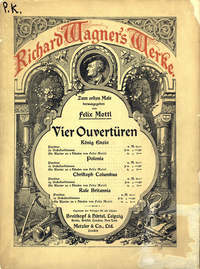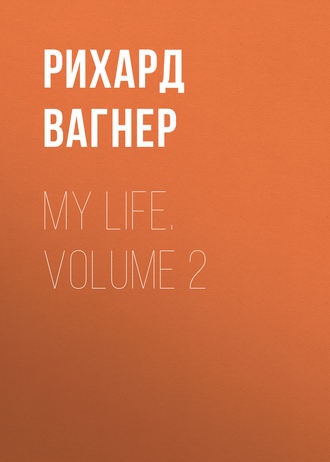 полная версия
полная версияMy Life. Volume 2
However, while Tannhauser was now rapidly spreading to the middle-class German theatres, I became a prey to great uneasiness as to the quality of these performances, and could never get a very clear idea of them. As my presence was prohibited everywhere, I had recourse to a very detailed pamphlet which was to serve as a guide to the production of my work, and convey a correct idea of my purpose. I had this somewhat voluminous work printed at my own expense and tastefully bound, and to every theatre that had given an order for the operatic score I sent a number of copies of it, with the understanding that they were to be given to the conductor, stage manager, and principal performers for perusal and guidance. But from that time I have never heard of a single person who had either read this pamphlet or taken any notice of it. In the year 1864, when all my own copies had been exhausted, owing to my painstaking distribution of them, I found to my great delight, among the theatrical archives, several copies that had been sent to the Munich Court Theatre, quite intact and uncut. I was therefore in the agreeable position of being able to procure copies of the missing pamphlet for the King of Bavaria, who wished to see it, as well as for myself and some friends.
It was a singular coincidence that the news of the diffusion of my opera through the German theatres should synchronise with my resolve to compose a work in the conception of which I had been so decidedly influenced by the necessity of being absolutely indifferent to our own theatres; yet this unexpected turn of events in no wise affected my treatment of my design. On the contrary, by keeping to my plan, I gained confidence and let things take their own course, without attempting in any way to promote the performances of my operas. I just let people do as they liked, and looked on surprised, while continual accounts reached my ears of remarkable successes; none of them, however, induced me to alter my verdict on our theatres in general or on the opera in particular. I remained unshaken in my resolve to produce my Nibelungen dramas just as though the present operatic stage did not exist, since the ideal theatre of my dreams must of necessity come sooner or later. I therefore composed the libretto of the Rheingold in the October and November of that year, and with that I brought the whole cycle of the Nibelungen myth as I had evolved it to a conclusion. At the same time I was rewriting Junger Siegfried and Siegfrieds Tod, especially the latter, in such a way as to bring them into proper relation with the whole; and by so doing, important amplifications were made in Siegfrieds Tod which were in harmony with the now recognised and obvious purpose of the whole work. I was accordingly obliged to find for this last piece a new title suited to the part it plays in the complete cycle. I entitled it Gotterdammerung, and I changed the name Junger Siegfried to Siegfried, as it no longer dealt with an isolated episode in the life of the hero, but had assumed its proper place among the other prominent figures in the framework of the whole. The prospect of having to leave this lengthy poem for some time entirely unknown to those whom I might expect to be interested in it was a source of great grief to me. As the theatres now and then surprised me by sending me the usual royalties on Tannhauser, I devoted a part of my profits to having a number of copies of my poem neatly printed for my own use. I arranged that only fifty copies of this edition de luxe should be struck off. But a great sorrow overtook me before I had completed this agreeable task. It is true, I met on all sides with indications of sympathetic interest in the completion of my great lyric work, although most of my acquaintances regarded the whole thing as a chimera, or possibly a bold caprice. The only one who entered into it with any heartiness or real enthusiasm was Herwegh, with whom I frequently discussed it, and to whom I generally read aloud such portions as were completed. Sulzer was much annoyed at the remodelling of Siegfrieds Tod, as he regarded it as a fine and original work, and thought it would be deprived of that quality if I decided to alter it to any extent. He therefore begged me to let him have the manuscript of the earlier version to keep as a remembrance; otherwise it would have been entirely lost. In order to get an idea of the effect of the whole poem when rendered in complete sequence, I decided, only a few days after the work was completed in the middle of December, to pay a short visit to the Wille family at their country seat, so as to read it aloud to the little company there. Besides Herwegh, who accompanied me, the party there consisted of Frau Wille and her sister, Frau von Bissing. I had often entertained these ladies with music in my own peculiar fashion during my pleasant visits to Mariafeld, about two hours' walk from Zurich. In them I had secured a devoted and enthusiastic audience, somewhat to Herr Wille's annoyance, as he often admitted that he had a horror of music; nevertheless, he ended in his jovial way by taking the matter good humouredly.
I arrived towards evening, and we attacked Rheingold at once, and as it did not seem very late, and I was supposed to be capable of any amount of exertion, I went on with the Walkure until midnight. The next morning after breakfast it was Siegfried's turn, and in the evening I finished off with Gotterdammerung. I thought I had every reason to be satisfied with the result, and the ladies in particular were so much moved that they ventured no comment. Unfortunately the effort left me in a state of almost painful excitement; I could not sleep, and the next morning I was so disinclined for conversation that I left my hurried departure unexplained. Herwegh, who accompanied me back alone, appeared to divine my state of mind, and shared it by maintaining a similar silence.
However, I now wished to have the pleasure of confiding the whole completed work to my friend Uhlig at Dresden. I carried on a regular correspondence with him, and he had followed the development of my plan, and was thoroughly acquainted with every phase of it. I did not want to send him the Walkure before the Rheingold was ready, as the latter should come first, and even then I did not want him to see the whole thing until I could send him a handsomely printed copy. But at the beginning of the autumn I discerned in Uhlig's letters grounds for feeling a growing anxiety as to the state of his health. He complained of the increase in his serious paroxysms of coughing, and eventually of complete hoarseness. He thought all this was merely weakness, which he hoped to overcome by invigorating his system with the cold-water treatment and long walks. He found the violin work at the theatre very exhausting, but if he took a sharp seven hours' walk into the country he invariably felt much better. However, he could not rid himself of his chest attacks or of his hoarseness, and had a difficulty in making himself heard even when speaking to a person quite near him. Up to that time I had been unwilling to alarm the poor fellow, and always hoped that his condition would necessitate his consulting a doctor, who would naturally prescribe rational treatment. Now, however, as I was continually hearing nothing from him but assurances of his confidence in the principles of the water cure, I could contain myself no longer, and I entreated him to give up this madness and place himself in the hands of a sensible doctor, for in his condition what he most needed was, not strength, but very careful attention. The poor man was extremely alarmed at this, as he gathered from my remarks that I feared he was already in an advanced stage of consumption. 'What is to become of my poor wife and children,' he wrote, 'if that is really the case?' Unhappily, it was too late; with the last strength that was left him he tried to write to me again, and finally my old friend Fischer, the chorus-master, carried out Uhlig's instructions, and when these were no longer audible he had to bend down close to his lips. The news of his death followed with frightful rapidity. It took place on the 3rd of January, 1853. Thus, in addition to Lehrs, another of my really devoted friends was carried off by consumption. The handsome copy of the Ring des Nibelungen I had intended for him lay uncut before me, and I sent it to his youngest boy, whom he had christened Siegfried. I asked his widow to let me have any pamphlets of a theoretical nature he might have left behind, and I came into possession of several important ones, among them the longer essay on 'Theme-Structure.' Although the publication of these works would involve a great deal of trouble, owing to the necessity of revising them, I asked Hartel of Leipzig if he would pay the widow a fair sum for a volume of Uhlig's writings. The publisher declared he could not undertake to bring it out without payment, as works of that nature were quite unremunerative. It was obvious to me, even at that time, how thoroughly every musician who had taken a keen interest in me had made himself disliked in certain circles.
Uhlig's melancholy death gave my home-circle the whip-hand over me with regard to my theories on the subject of water cures. Herwegh impressed upon my wife that she must insist upon my taking a glass of good wine after all the exertion I underwent at the rehearsals and concerts which I was attending throughout that winter. By degrees, also, I again accustomed myself to enjoy such mild stimulants as tea and coffee, my friends meanwhile perceiving to their joy that I was once more becoming a man amongst men. Dr. Rahn-Escher now became a welcome and comforting friend and visitor, who for many years thoroughly understood the management of my health, and especially the misgivings arising from the over-wrought state of my nerves. He soon verified the wisdom of his treatment, when in the middle of February I had undertaken to read my tetralogy aloud on four consecutive evenings before a larger audience. I had caught a severe cold after the first evening, and on the morning of the day for the second reading I awoke suffering from severe hoarseness. I at once informed the doctor that my failure to give the reading would be a serious matter to me, and asked him what he advised me to do to get rid of the hoarseness as speedily as possible. He recommended me to keep quiet all day, and in the evening to be taken well wrapped up to the place where the readings were to be held. When I got there I was to take two or three cups of weak tea, and I should be all right; whereas if I worried over the failure to keep my engagement I might become seriously worse. And, indeed, the reading of this stirring work went off capitally, and I was, moreover, able to continue the readings on the third and fourth evenings, and felt perfectly well. I had secured a large and handsome room for these meetings in the Hotel Baur au lac, and had the gratifying experience of seeing it fuller and fuller each evening, in spite of having invited only a small number of acquaintances, giving them the option of bringing any friends who they thought would take a genuine interest in the subject and not come out of mere curiosity. Here, too, the verdict seemed altogether favourable, and it was from the most serious university men and government officials that I received assurances of the greatest appreciation as well as kindly remarks, showing that my poem and the artistic ideas connected with it had been fully understood. From the peculiar earnestness with which they gave vent to their opinions, which in this case were so confidently unanimous, the idea occurred to me to try how far this favourable impression might be utilized to serve the higher aims of art. In accordance with the superficial views generally prevailing on the subject, every one seemed to think I might be induced to make terms with the theatre. I tried to think out how it would be possible to convert the ill-equipped Zurich theatre into a highly developed one by adopting sound principles, and I laid my views before the public in a pamphlet entitled 'A Theatre in Zurich.' The edition, consisting of about a hundred copies, was sold, yet I never noticed the least indication of any result from the publication; the only outcome was, that at a banquet of the Musical Society my excellent friend, Herr Ott-Imhoff, expressed his entire disagreement with the statements uttered by various people, that these ideas of mine were all very grand, but unfortunately quite impracticable. Nevertheless, my propositions lacked the one thing that would have made them valuable in his eyes, namely my consent to take over the management of the theatre in person, as he would not entrust the carrying out of my ideas to anyone but myself. However, as I was obliged to declare then and there that I would not have anything to do with such a scheme, the matter dropped, and in my inmost heart I could not help thinking that the good people were quite right.
Meanwhile, the sympathetic interest in my works was increasing. As I now had to refuse firmly to yield to my friends' wishes for a performance of my principal works at the theatre, I begged to be allowed to arrange a selection of characteristic pieces, which could easily be produced at concerts, so soon as I could obtain the requisite support. A subscription list was accordingly circulated, and it had the satisfactory result of inducing several well-known art patrons to put their names down to guarantee expenses. I had to undertake to engage an orchestra to suit my requirements. Skilled musicians from far and near were summoned, and after interminable efforts I began to feel that something really satisfactory would be achieved.
I had made arrangements that the performers should stay at Zurich a whole week from Sunday to Sunday. Half of this time was allotted exclusively to rehearsals. The performance was to take place on Wednesday evening, and on Friday and Sunday evenings there were to be repetitions of it. The dates were the 18th, 20th, and 22nd of May, my fortieth birthday falling on the last-named date. I had the joy of seeing all my directions accurately carried out. From Mayence, Wiesbaden, Frankfort, and Stuttgart, and on the other side, from Geneva, Lausanne, Bale, Berne, and the chief towns in Switzerland, picked musicians arrived punctually on Sunday afternoon. They were at once directed to the theatre, where they had to arrange their exact places in the orchestral stand I had previously designed at Dresden—and which proved excellent here too—so as to begin rehearsing the first thing next morning without delay or interruption. As these people were at my disposal in the early morning and in the evening, I made them learn a selection of pieces from the Fliegender Hollander, Tannhauser, and Lohengrin. I had greater trouble in trying to train them for a chorus, but this too turned out very satisfactorily. There was nothing in the way of solo-singing, except the Ballad of Senta from the Hollander, which was sung by the wife of the conductor Heim in a good though untrained voice, and with an amount of spirit that left nothing to be desired. As a matter of fact, the performances could hardly be called public concerts, but were rather of the nature of family entertainments. I felt I was fulfilling a sincere desire on the part of a larger circle of acquaintances by introducing them to the true nature of my music, rendered as intelligibly as circumstances permitted. As, at the same time, it was desirable that they should have some knowledge of the poetical basis of it, I invited those who intended to be present at my concerts to come for three evenings to the Musical Society's concert-hall to hear me read aloud the libretto of the three operas, portions of which they were about to hear. This invitation met with an enthusiastic response, and I was now able to hope that my audience would come better prepared to listen to the selections from my operas than had ever been the case before. The fact that pleased me most in the performances on these three evenings was that I was able for the first time to produce something from Lohengrin myself, and could thus get an idea of the effect of my combination of the instrumental parts in the overture to that work.
Between the performances there was a banquet which, with the exception of a subsequent one at Pesth, was the only function of the sort ever held in my honour. I was sincerely and deeply affected by the speech of the aged President of the Musical Society, Herr Ott-Usteri. He drew the attention of all those musicians who had come together from so many places to the significance of their meeting, and its objects and results, and recommended as a trustworthy guide to them on their homeward journey the conviction they had all doubtless arrived at, that they had come into close and genuine touch with, a wonderful new creation in the realm of art.
The sensation produced by these evening concerts spread through the whole of Switzerland in ever-widening circles. Invitations and requests for further repetitions of them poured in from distant towns. I was assured that I might well repeat the three performances in the following week without any fear of seeing a diminution in the audience. When this project was discussed, and I pleaded my own fatigue, and also expressed the desire to retain for these concerts their unique character by not allowing them to become commonplace, I was very glad to have the powerful and intelligent support of my friend Hagenbuch, who on this occasion was indefatigable. The festival was concluded, and the guests were dismissed at the appointed time.
I had hoped to be able to welcome Liszt among the visitors, as he had celebrated a 'Wagner week' at Weimar in the previous March by performing three operas of which I had only given portions here. Unfortunately he was unable to leave just then, but by way of amends he promised me a visit at the beginning of July. Of my German friends, only the faithful Mme. Julie Kummer and Mme. Emilie Ritter arrived in time. As these two ladies had gone on to Interlaken at the beginning of June, and I also began to feel in great need of a change, I started with my wife, towards the end of the month, for a short holiday. The visit was spoilt in the most dismal fashion by continuous rain; and on the 1st of July, as we were starting in desperation on our homeward journey to Zurich with our lady friends, magnificent summer weather set in, which lasted a considerable time. With affectionate enthusiasm we at once attributed this change to Liszt, as he arrived in Switzerland in the best of spirits immediately after we had returned to Zurich. Thereupon followed one of those delightful weeks, during which every hour of the day becomes a treasured memory. I had already taken more roomy apartments on the second floor in the so-called Vorderen Escher Hausern, in which I had before occupied a flat that was much too small on the ground floor. Frau Stockar-Escher, who was part owner of the house, was enthusiastically devoted to me. She was full of artistic talent herself, being an excellent amateur painter in water-colours, and had taken great pains to rearrange the new dwelling as luxuriously as possible. The unexpected improvement in my circumstances brought about by the continued demands for my operas, allowed me to indulge my desire for comfortable domestic arrangements, which had been reawakened since my stay at the hydropathic establishment, and which, after being repressed, had become quite a passionate longing.
I had the flat so charmingly furnished with carpets and decorative furniture that Liszt himself was surprised into admiration as he entered my 'petite elegance', as he called it. Now for the first time I enjoyed the delight of getting to know my friend better as a fellow-composer. In addition to many of his celebrated pianoforte pieces, which he had only recently written, we went through several new symphonies with great ardour, and especially his Faust Symphony. Later on, I had the opportunity of describing in detail the impressions I received at this time in a letter which I wrote to Marie von Wittgenstein, which was afterwards published. My delight over everything I heard by Liszt was as deep as it was sincere, and, above all, extraordinarily stimulating. I even thought of beginning to compose again after the long interval that had elapsed. What could be more full of promise and more momentous to me than this long-desired meeting with the friend who had been engaged all his life in his masterly practice of music, and had also devoted himself so absolutely to my own works, and to diffusing the proper comprehension of them. Those almost bewilderingly delightful days, with the inevitable rush of friends and acquaintances, were interrupted by an excursion to the Lake of Lucerne, accompanied only by Herwegh, to whom Liszt had the charming idea of offering a 'draught of fellowship' with himself and me from the three springs of the Grutli.
After this my friend took leave of us, after having arranged for another meeting with me in the autumn.
Although I felt quite disconsolate after Liszt's departure, the officials of Zurich took good care that I should soon have some diversion, of a kind to which I had hitherto been a stranger. It took the form of the presentation of a masterpiece of calligraphy in the shape of a 'Diploma of Honour,' awarded me by the Zurich Choral Society, which was ready at last. This was to be awarded to me with the accompaniment of an imposing torchlight procession, in which the various elements of the Zurich population, who, either as individuals or members of societies, were favourably disposed to me, were to take part. So it came to pass that one fine summer evening a large company of torchbearers approached the Zeltweg, to the accompaniment of loud music. They presented a spectacle such as I had never seen before, and made a unique impression on my mind. After the singing, the voice of the President of the Choral Society could be heard rising from the street. I was so much affected by the incident that my unconquerable optimism quickly overpowered every other sensation. In my speech of acknowledgment I indicated plainly that I saw no reason why Zurich itself should not be the chosen place to give an impetus to the fulfilment of the aspirations I cherished for my artistic ideals, and that it might do so on proper civic lines. I believe this was taken to refer to a special development of the men's choral societies, and they were quite gratified at my bold forecasts. Apart from this confusion, for which I was responsible, that evening's ceremony and its effects on me were very cheerful and beneficial.
But I still felt the peculiar disinclination and fear of taking up composing again that I had previously experienced after protracted pauses in musical production. I also felt very much exhausted by all I had done and gone through, and the ever-recurring longing to break completely with everything in the past, that had unfortunately haunted me since my departure from Dresden, as well as the desire and yearning for new and untried surroundings, fostered by that anxiety, now acquired fresh and tormenting vigour. I felt that before entering on such a gigantic task as the music to my drama of the Nibelungen, I must positively make one final effort to see whether I could not, in some new environment, attain an existence more in harmony with my feelings than I could possibly aspire to after so many compromises. I planned a journey to Italy, or such parts of it as were open to me as a political refugee. The means for carrying out my wish were readily placed at my disposal through the kindness of my friend Wesendonck, who has ever since that time been devoted to me. However, I knew it was inadvisable to take that journey before the autumn, and as my doctor had recommended some special treatment for strengthening my nerves—even if only to enjoy Italy—I decided first of all to go to St. Moritz Bad in the Engadine. I started in the latter half of July, accompanied by Herwegh. Strangely enough, I have often found that what other people could note in their diaries merely as an ordinary visit or a trivial expedition, assumed for me the character of an adventure. This occurred on our journey to the Bad, when, owing to the coaches being crowded, we were detained at Chur in an incessant downpour of rain. We were obliged to pass the time in reading at a most uncomfortable inn. I got hold of Goethe's West-ostlichen Divan, for the reading of which I had been prepared by Daumer's adaptation of Hafiz. To this day I never think of Goethe's words in elucidating these poems without recalling that wretched delay in our journey to the Engadine. We did not get on much better at St. Moritz; the present convenient Kurhaus was not then in existence, and we had to put up with the roughest accommodation; this was particularly annoying to me on Herwegh's account, as he had not gone there for health, but simply for enjoyment. However, we were soon cheered by the lovely views of the grand valleys, which were quite bare but for the Alpine pastures, that met our eyes on our way down the steep slopes into the Italian valleys. After we had secured the schoolmaster at Samaden as a guide to the Rosetch glacier, we embarked on more serious expeditions. We had confidently looked forward to exceptional enjoyment in thus penetrating beyond the precipices of the great Mont Bernina, to which we gave the palm for beauty above Mont Blanc itself. Unfortunately the effect was lost on my friend, owing to the tremendous exertions by which the ascent and crossing of the glacier were attended. Once again, but this time to an even greater degree, I felt the sublime impression of the sacredness of that desolate spot, and the almost benumbing calm which the disappearance of all vegetation produces on the pulsating life of the human organism. After we had been wandering for two hours, deep in the glacier path, we partook of a meal we had brought with us, and champagne, iced in the fissures, to strengthen us for our wearisome return. I had to cover the distance nearly twice over, as, to my astonishment, Herwegh was in such a nervous condition that I had repeatedly to go backwards and forwards, showing him the way up and down before he would decide to follow. I then realised the peculiarly exhausting nature of the air in those regions, as on our way back we stopped at the first herdsman's cottage, and were refreshed with some delicious milk. I swallowed such quantities of it that we were both perfectly amazed, but I experienced no discomfort whatever in consequence.


